
Diablo Lake vista, Ross Lake National Recreation Area, North Cascades Complex / Rebecca Latson
The North Cascades Complex – comprised of North Cascades National Park, Lake Chelan National Recreation Area, and Ross Lake National Recreation Area – is wild and rugged, with fewer lodging choices than Yellowstone National Park, Yosemite National Park, or other more-visited national parks. When I decided I wanted to photograph within the North Cascades Complex, I ran a Google search and pulled up an article by the Seattle Times listing the North Cascades Institute’s Environmental Learning Center as a lodging choice. I then read the Traveler’s 2010 article about the Institute’s Base Camp program, listened to the Traveler’s Podcast Episode 19 interview with Saul Weisberg, the Institute’s founder, and looked through the Learning Center’s website. I decided to try the Base Camp option ($170 per night, meals included, for one; per-person prices drop with more in your group) and want to describe it here, as a possible choice for any of you who might wish a longer, closer look at the “North American Alps.”
The Learning Center’s Base Camp offers visitors a place to hang their hat at night, three daily meals, nearby trails to explore, and two daily scheduled learning activities.

Trails around the Learning Center, Ross Lake National Recreation Area, North Cascades Complex / North Cascades Institute
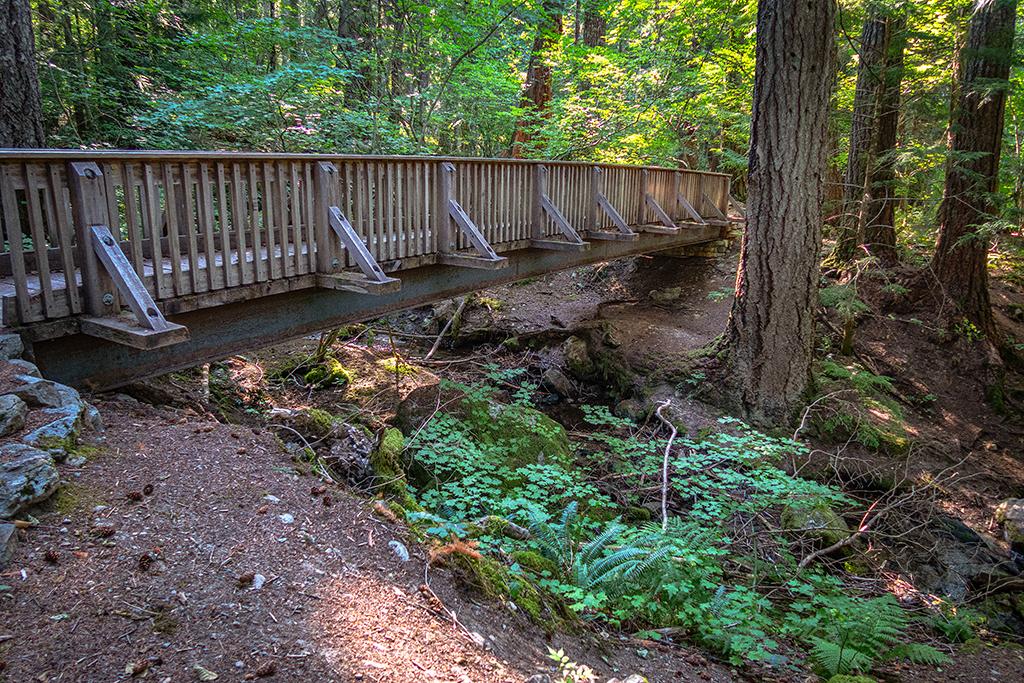
Where will that trail bridge take you? Ross Lake National Recreation Area, North Cascades Complex / Rebecca Latson
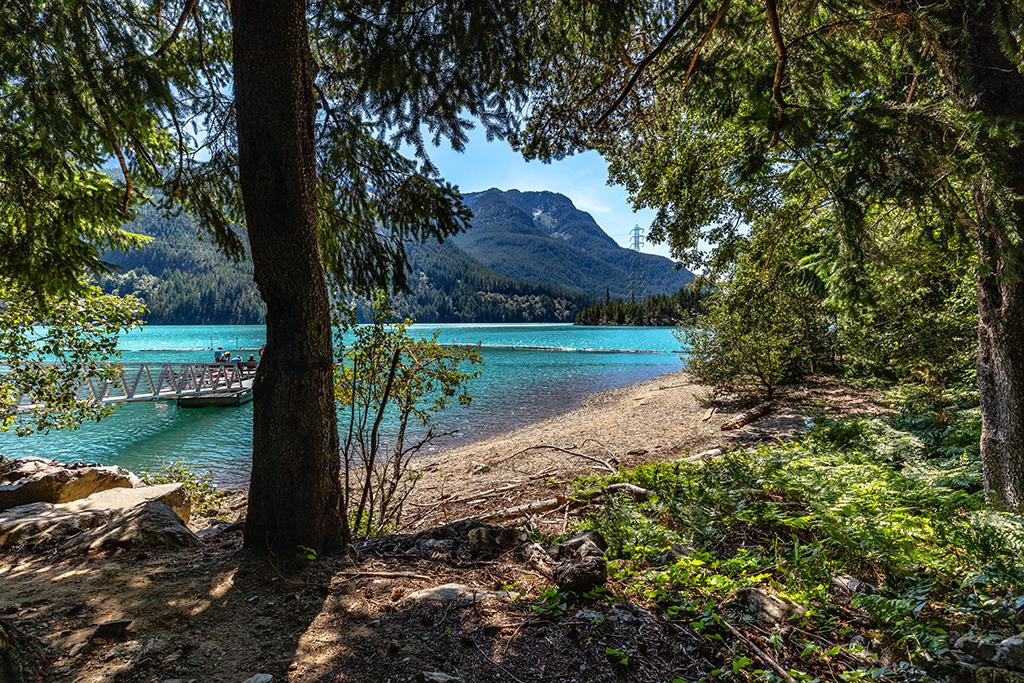
A place to rest and contemplate the view, Ross Lake National Recreation Area, North Cascades Complex / Rebecca Latson

Enjoying a morning snack, Ross Lake National Recreation Area, North Cascades Complex / Rebecca Latson

A fledgling robin on campus, Ross Lake National Recreation Area, North Cascades Complex / Rebecca Latson

Pearly Everlasting, Ross Lake National Recreation Area, North Cascades Complex / Rebecca Latson
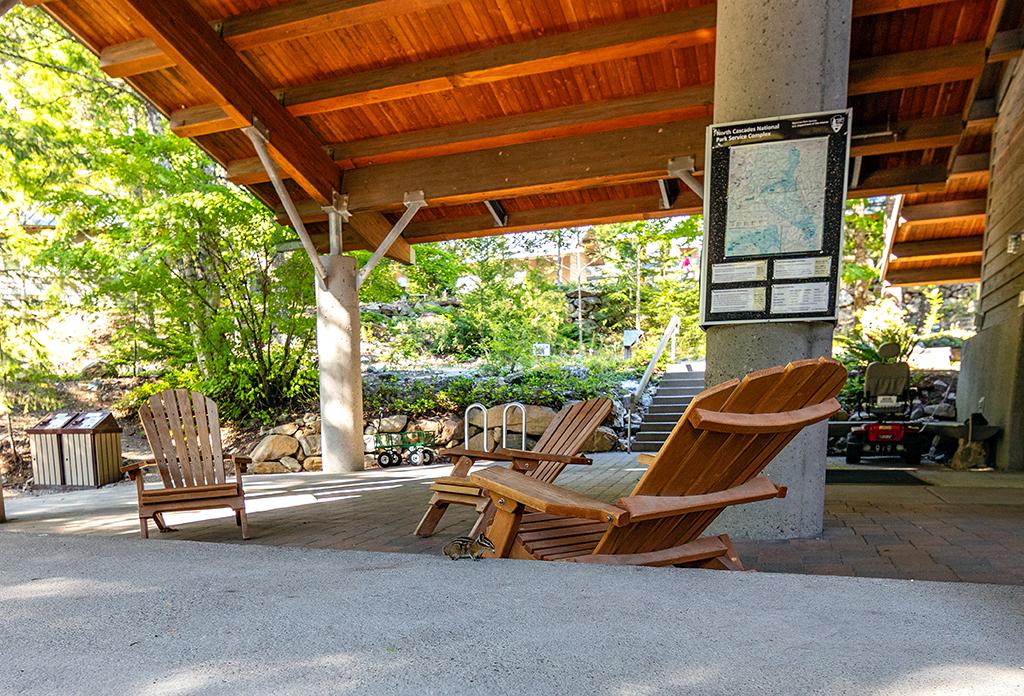
Places to sit and rest on campus, Ross Lake National Recreation Area, North Cascades Complex / Rebecca Latson
In fact, the mission of the North Cascades Institute and Environmental Learning Center is to "inspire and empower environmental stewardship for all through transformative experiences in nature” and to “connect people, nature and community through science, art, literature and the hands-on study of the natural and cultural history of the Pacific Northwest.”
The Learning Center is nestled along the Diablo Lake shoreline, less than a mile from Diablo Dam. You must drive across the dam to get to the campus complex of buildings that include office, classrooms, dining hall, and sleeping quarters.

Environmental Learning Center campus map, Ross Lake National Recreation Area, North Cascades Complex / North Cascades Institute

Welcoming signs at the Environmental Learning Center, Ross Lake National Recreation Area, North Cascades Complex / Rebecca Latson

The Environmental Learning Center office, bookstore, and classrooms, Ross Lake National Recreation Area, North Cascades Complex / Rebecca Latson

Exploring the campus, Ross Lake National Recreation Area, North Cascades Complex / Rebecca Latson

The Learning Center's amphitheater and dining hall, Ross Lake National Recreation Area, North Cascades Complex / Rebecca Latson
Depending upon the time of year, parking in the gravel lot might be a little problematic, since the parking lot serves not only the Learning Center campus but also Skagit Tours at Diablo Lake, offered through the partnership between the North Cascades Institute and Seattle City Lights. Additionally, the parking lot is available for day trippers wanting to explore the dam and nearby area and perhaps dip their toes in the lake (FYI, the water in glacially fed Diablo Lake stays around 45-50 degrees Fahrenheit). On a summer weekend, it can get pretty crowded, but parking opens up later in the evening, and weekdays see plenty of open spaces, as well.

Looking up toward the Learning Center's lodges, Ross Lake National Recreation Area, North Cascades Complex / Rebecca Latson
Breakfast and dinner are cooked fresh daily and served buffet-style in the dining hall. Makings for a sack lunch are placed out during breakfast. Above each food selection is a small blackboard on which is written the dish name and whether it is vegan and/or gluten-free. These hot meals are included with the price of your stay, which is a pretty sweet deal. Coffee and water wash down the great food.

A Base Camp dinner in the Learning Center's dining hall, Ross Lake National Recreation Area, North Cascades Complex / Rebecca Latson

A Base Camp breakfast in the Learning Center's dining hall, Ross Lake National Recreation Area, North Cascades Complex / Rebecca Latson
Check-in for the first day of Base Camp begins at 3 p.m., orientation begins at 5 p.m., and dinner is at 6 p.m. I arrived around 2 p.m., turned in my signed release form, but was not allowed to enter my room until 3 p.m. So, no early move-in, in case you wondered.
The morning and nightly group activities are written on a whiteboard next to the office. I joined other Base Campers that first day for the Diablo Dam evening walk. I captured some cool photos while learning about this dam and how the lake came by its incredible color from Learning Center staff member Emilee, our guide for that evening's walk.

The evening Dam Walk, Ross Lake National Recreation Area, North Cascades Complex / Rebecca Latson
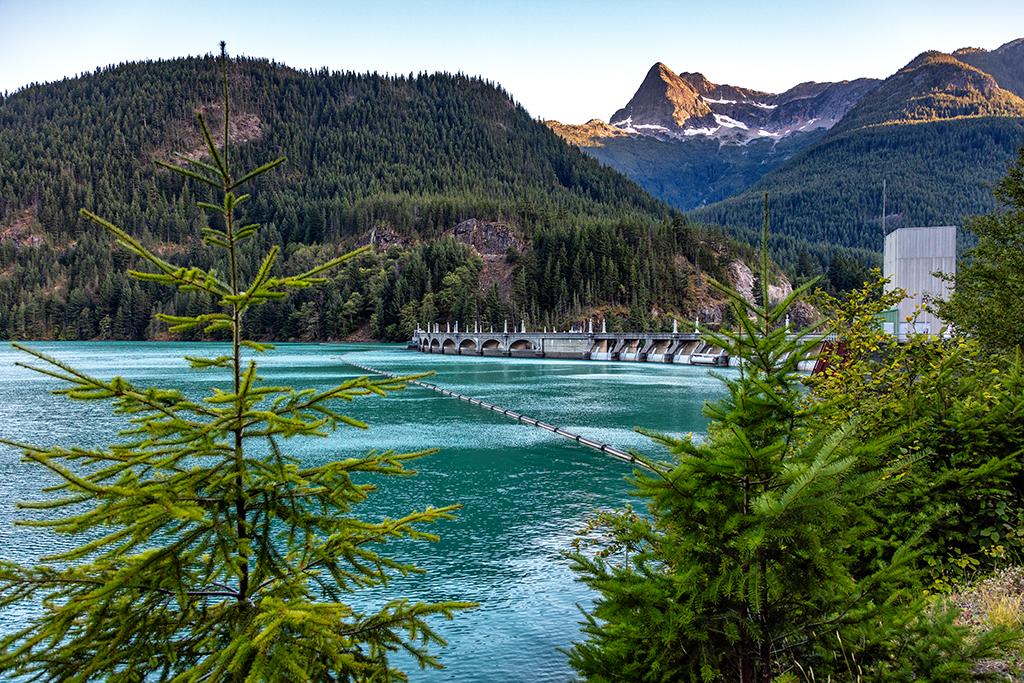
A glimpse of Diablo Dam, Ross Lake National Recreation Area, North Cascades Complex / Rebecca Latson
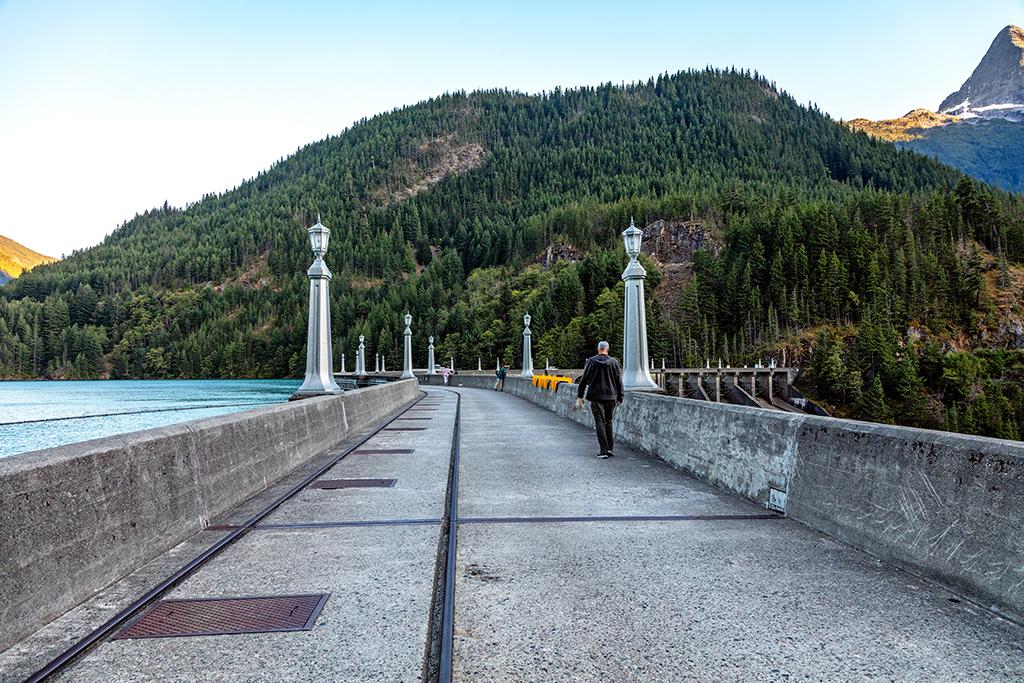
An evening walk on Diablo Dam, Ross Lake National Recreation Area, North Cascades Complex / Rebecca Latson

The view on one side of Diablo Dam, Ross Lake National Recreation Area, North Cascades Complex / Rebecca Latson

The view on the other side of Diablo Dam, Ross Lake National Recreation Area, North Cascades Complex / Rebecca Latson
While the Learning Center’s website has a Frequently Asked Questions page covering most issues, I thought I’d explain a few things that I, myself, noticed or needed getting used to:
No pets are allowed on campus.
I know many people enjoy bringing their furry family members with them, and I saw people walking their dogs on leashes in the area. However, those were visitors to the area and were not actually staying on campus. While the Learning Center complex sits upon National Park Service land and the National Park Service is the steward for Ross Lake National Recreation Area, where leashed pets are allowed to roam with their owners in tow, no pets are allowed on the campus itself. For more information about where you can take your dog within North Cascades National Park, click here.
Shoes Off, Please.

Shoes off at the lodge, Ross Lake National Recreation Area, North Cascades Complex / Rebecca Latson
The Learning Center’s “First Timers Guide” I received prior to my visit suggests bringing a change of shoes/slippers to wear inside the lodge room, so I was a little confused when I saw “Shoes off, please” notices painted on each lodge door. I walked around in socked feet until observing some guests wearing flip flops. I’d packed slippers in my suitcase, so I started wearing them when in my room and walking to the gender-specific bathrooms down the hall. For those of you who are accustomed to removing your shoes before entering your home, it’s an easy thing to remember. For those of you who are not (like me), it takes a little more effort to remember to take those hiking boots off.
No locks on the doors.
Aside from that lockbox in each closet, there are no locks on any of the doors. I was told I could lock my room door from the inside but was warned it might be easy to forget and lock myself out. I looked on both sides of my room door and found no locks, but didn’t inspect the side of the door, which is probably where there is a button to push that locks the door. I can see where something like that might make it easy to forget and ultimately lock one out.
As a lone woman traveler bringing quite a bit of gear to photograph for the Traveler, I did not particularly like this aspect of my room. With the traveling I do, and the camera and computer gear I carry with me, I like being able to lock my room door, and not all of my camera/computer gear fit into the room’s lockbox. While one could argue that anybody staying at the Learning Center is not going to mess with others’ items, there is always the concern of a non-Learning Center visitor walking through the complex to find doors unlocked.
Yes, there is WiFi.
And it works very well. While there is no cell service, I still managed to send and receive texts and emails and let my family know I was doing fine.
Parking is not next to your lodge room.
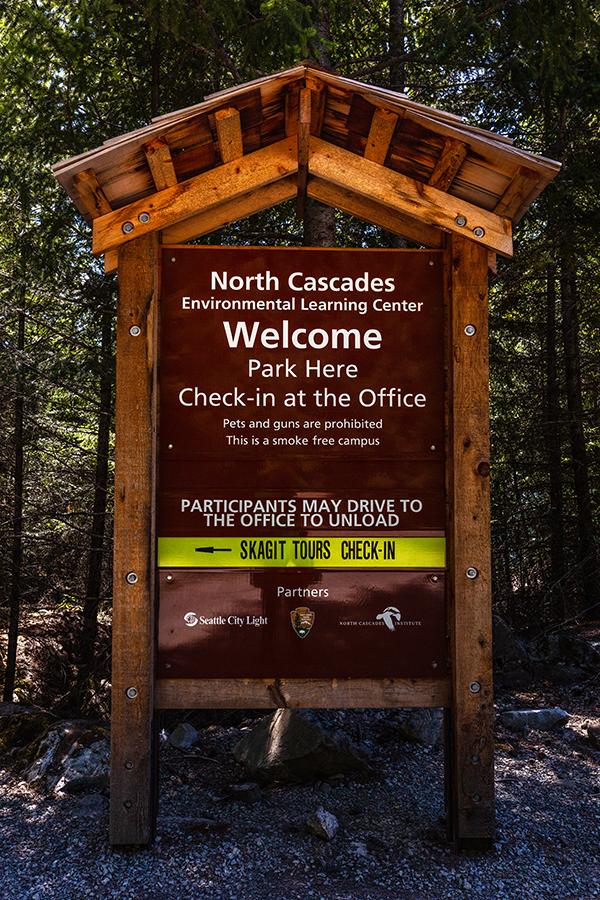
The sign in the gravel parking lot, Ross Lake National Recreation Area, North Cascades Complex / Rebecca Latson
It’s a bit of a haul if you want to drag your luggage along the path, then up some steps to the office, then up more steps to your lodge room. You can drive your vehicle up to the office and unload, shortening the distance a bit, but you cannot drive right next to your lodge room.
All in all, aside from the lock misgivings, having to tote my heavy suitcase, laptop and camera backpacks a bit of distance to my room, and getting used to taking my shoes off each time I entered the lodge, my two-night Base Camp experience was a positive one. The staff I met are knowledgeable about the area and love what they are doing. I enjoyed the food (went back for seconds of the roasted root vegetables during that first night’s dinner). I learned a little about the area, met interesting people from different parts of the U.S. (including one young lady who also formerly lived in the Houston area), and was able to photograph places like Diablo Lake Overlook during sunrise and early morning hours, something I might not have been able to do had I driven the five hours straight from Yakima that same day (unless, of course, I left home at midnight).
During the Traveler’s podcast interview with Mr. Weisberg, mention was made that fewer older people appear to be taking advantage of the Learning Center’s Base Camp, for whatever reasons. At age 58, with rheumatoid arthritis, I can tell you that I explored with ease the campus and surrounding area. I could roam the area around the campus or hop into my car and drive to different parts of the North Cascades for a day of photography, enjoy hot meals I didn’t have to prepare myself (and that were included in the price of the stay), attend a couple of learning activities if I so chose, download my photos and check my emails, then get a good night’s rest before waking to the next day’s adventure. The thing I liked best, I believe, was that I learned a few new things about my Pacific Northwest home and the North Cascades, specifically. Nobody is ever too old to learn, and the North Cascades Institute’s Environmental Learning Center encourages that opportunity through their Base Camp option.

On-campus sculpture, Ross Lake National Recreation Area, North Cascades Complex / Rebecca Latson
Traveler footnote: North Cascades Institute is a supporter of the Traveler.




 Support Essential Coverage of Essential Places
Support Essential Coverage of Essential Places







Comments
Best write up and photos of NCI yet ! As a retired NPS ranger with 6 summers in NOCA, and now living just east of the park, I appreciate seeing an accurate portayal of my area. It's not yet completely protected however. Please go to Americanalps.org to find out how you can help. Mazama.org will direct you to the nicest places to stay on the east side. Still missing also, is a grand lodge in the traditional NPS style for the west side, which will be needed as more people discover the American Alps, and NCI is fully booked.